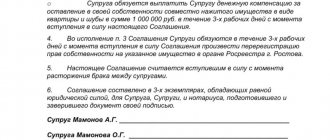Types of collateral
Article 140 of the Civil Procedure Code of the Russian Federation establishes a list of interim measures. When dividing jointly acquired property, the following measures are applied.
Arrest
It is imposed on property registered in the name of the respondent spouse. This can be either movable (car, furniture, etc.) or immovable property (apartment, plot of land, etc.). This encumbrance also applies to funds, cash or bank deposits.
In this case, the seized item may be in the use of either one of the spouses or other persons.
Prohibition to carry out specific actions
The defendant is not allowed to carry out a number of procedures during the period of restrictions. As a rule, these are any manipulations that are aimed at alienating a thing (purchase and sale, donation, etc.) or its damage or destruction (disassembly, dismantling).
Prohibition of other persons to carry out actions related to acquired and subject to division of marital property
The ban may apply to actions that could lead to damage or destruction of the item. In addition, a prohibition may be imposed on transferring property to the defendant or fulfilling any obligations.
An example from judicial practice
Petrov A.P. borrowed money from the Valuev spouses in the amount of 500,000 rubles. The transaction was formalized with a receipt issued only in the name of O.D. Valuev’s husband. After some time, the couple decided to divorce. When filing a claim for division of property, Valuev’s wife A.B. filed a petition for security.
The court imposed restrictions, prohibiting Petrov A.P. return the borrowed money to the defendant O.D. Valuev, who was listed on the receipt. The motivation for this decision was that these funds are family funds. Returning them only to the husband may complicate the division in the future.
- Property that is pledged cannot be seized.
- The court has the right to apply one security measure or several at the same time.
Joint property
As a general rule, the property of spouses is joint. This applies to things acquired during marriage, accumulated money and other property. In accordance with the law, the income of spouses during a registered marriage is considered common, therefore everything acquired with them becomes joint. This matrimonial property regime continues until the spouses enter into a prenuptial agreement or property division agreement. After its conclusion, the property may become personal.
The rules for determining the common joint property of spouses are enshrined in Articles 33 – 36 of the Family Code of the Russian Federation. There are also exceptions. Property acquired before marriage, received as a gift or inheritance, as well as personal belongings of each spouse (with the exception of luxury items) will not be considered joint.
Community property means that each spouse has a right to it.
The obligations of spouses can also be joint if both spouses have assumed them. In this case, both husband and wife become responsible for their implementation. An obligation assumed by one of the spouses, who spent everything received for the needs of the family (Clause 2 of Article 45 of the RF IC), can also be recognized as joint. But the law also allows for the existence of personal obligations for each spouse.
The procedure for imposing an encumbrance
The court has the right to arrest or impose other restrictions at any time before it makes a decision. To do this, the interested person must submit a corresponding application. You can do this as follows:
- Directly in the text of the claim.
- A separate document along with the application.
- By an independent petition at any stage of the consideration of the case, before the court retires to the deliberation room.
The state fee is not paid when filing a request for arrest.
The court is obliged to consider the petition and make a decision on it on the day it is received. In this case, neither the husband, nor the wife, nor third parties are subject to summons. The court makes a decision alone.
If the petition is satisfied and the seizure is imposed, the corresponding decision is sent to the plaintiff and defendant. Also, the court immediately sends it to all registration authorities - Rosreestr, traffic police and other authorities. It is also sent to bailiffs.
Is it possible to seize joint property?
Content
The law allows the joint property of a man and a woman to be seized. The procedure can be initiated by a spouse who is interested in preserving the property, or by a judge considering the property dispute of the participants. In addition, a third party is involved in the procedure - bailiffs.
Timely establishment of encumbrances is a guarantee of protection of the property rights of participants. Violation of court orders leads to legal liability.
Information about the arrest is entered into the unified register of property and is displayed in the USRN extract. This is an additional protection of property rights that prevents the sale of real estate.
Contents and required documents
When drawing up an application, the following data is entered into its form:
- Name of the court.
- Parties to the case – full name, contact details.
- The title is “Petition to secure a claim.”
- Brief summary of the essence (“A case regarding the division of property is pending before the court” or “A claim for division has been filed”).
- Justification for the need to seize (“Without these measures it will be impossible or extremely difficult to execute the decision”). If there is information that the spouse is trying to alienate something from the joint property, evidence of this must be attached. For example, a screenshot of an advertisement for the sale of a car from the corresponding website.
- A list of specific property for which the plaintiff requests to be seized.
- Justification that this property is jointly acquired and subject to division.
- Demand to seize.
- Date, signature.
An example of a petition will be below in the article.
When a request for security measures is supposed to be stated in a statement of claim, this is done as follows:
- The text directly indicates the need to apply encumbrances.
- The property objects planned for interim measures are listed.
- In the pleading part of the claim, a separate paragraph sets out the demand for seizure.
It is highly advisable to attach documents confirming the rights to the property to the application. However, if they are not in hand (the other spouse does not give them) and it is impossible to obtain them on your own, then taking into account judicial practice, interim measures may be applied even without documents.
To do this, the property must be clearly identified in the application. That is, if this is real estate, indicate its name, address, location, area, cadastral number. In case of seizure of a car - its make, model, registration plate.
You can submit an application:
- In person, through the court office.
- Sent by mail.
- By filling out a special form on the court’s website, sealing it with an enhanced electronic signature.
If the situation is such that it is necessary to make an arrest as quickly as possible and prevent the unscrupulous spouse from reregistering family property, it is better to submit the petition in person. In this case, it will be immediately registered and sent to the judge. Throughout the day, the application will be considered and a decision will be made.
Types of property and features of arrest
Table No. 2 “Practical features of implementing restrictions”
| Object category | Peculiarities |
| Houseware | This category includes furniture, dishes, and technical equipment. The imposition of encumbrances occurs in the general manner. It is allowed to transfer property for storage to the second spouse |
| Automobile | Cars are subject to mandatory registration, therefore, after the writ of execution is issued, the document is transferred to the traffic police to enter information about encumbrances. Throughout the day, data is entered into the database to control unauthorized use of the machine |
Appeal
When the defendant receives an arrest warrant, he has the right to appeal it. He is given 15 days to do this from the date of receipt of the decision.
It makes sense to file a private complaint when the defendant’s sole property is seized. For example, for a house that he received under a will or as a gift. Since such property is not subject to division during a divorce, its seizure infringes on the rights of the defendant. Evidence must be provided to support the arguments presented.
A private complaint is filed with the same court that imposed the encumbrance. It is reviewed by a higher authority.
Filing a complaint does not in itself cancel interim measures. They begin to operate from the moment the decision is made.
Questions
My husband and I filed a lawsuit for division of property. During the trial, the court decided to seize the property and car. My husband and I recently reconciled and do not want to divide our property. What should I do?
The Code of Civil Procedure allows you to cancel encumbrances by mutual decision of the spouses or at the request of only one participant. The interested spouse prepares a petition to the court, which he submits to the chief judge at the next hearing. The petition must contain a request to terminate the civil proceedings due to the reconciliation of the participants.
Consequences of interim measures
When the court imposes security measures, the defendant does not have the right to dispose of the encumbered property. He will not be able to make a transaction with it that requires registration.
So, he may try to sell or donate a jointly owned apartment or car. When submitting documents for registration to Rosreestr or the State Traffic Safety Inspectorate, they will not be accepted. The transaction will not be registered.
In this case, such an unscrupulous spouse who violates the court decision is subject to a fine in the amount of 1,000 rubles.
How to find out if a property has been seized?
This information can be obtained online in different ways, depending on the type of property:
- Automobile. To check the car for the fact of arrest, you can use the website: State Traffic Safety Inspectorate, and you need to know the VIN / Body / Chassis of the car.
- Apartment. To check an apartment for arrest, you can use the Rossreestr website, but you need to know:
- cadastral number;
- conditional number;
- address;
Information may be displayed with some delay, it is important to take this into account.
Cancellation of arrest
Interim measures remain in force until the end of the proceedings. The following features are available:
- If the claim is rejected, the arrest is valid until the decision comes into force, but the court, when making it or after that, can cancel the security measures.
- If the demands are satisfied, the arrest remains in force until the decision is fully implemented. For example, if an apartment is divided, then until its part is re-registered in Rosreestr to the wife, the encumbrance continues to apply.
Also, security measures can be canceled if one of the parties requests it or on the initiative of the court. This is permissible at any stage of the proceedings.
In this case, the plaintiff and defendant are sent summonses to resolve this issue. If they do not appear, the court will consider the petition and make a decision without them.
When the arrest and other encumbrances are cancelled, the registration authorities are immediately informed about this. This decision can be appealed by the dissenting party.
Interim measures for the division of marital property
As part of the implementation of interim measures for the safety of property, the following actions can be performed:
- A ban is imposed on any actions with the disputed property in government bodies. It will be impossible to re-register a vehicle, donate an apartment or sell property subject to registration.
- The property is subject to a prohibition of use.
- The property is actually seized from the owner and placed in storage.
Example : The court may prohibit the spouses from using the car or evacuate it to a guarded parking lot. Alternatively, they will be able to use it, but will not be able to make changes to the registration.
Implementation of measures to seize property
When seizing property, the court independently informs:
- Interested government agencies.
- Defendant.
- Bailiffs.
The court is obliged to inform all authorities and demand the execution of interim measures without delay (Article 140 of the Code of Civil Procedure of the Russian Federation).
After receiving notice from the court, the bailiffs seize the property. If its location cannot be determined (as is often the case with vehicles), the property will first be put on the wanted list.
What property is allowed to be seized?
In practice, the question arises on which property is allowed to impose an interim measure.
Real estate
First of all, real estate falls under it. For example, an apartment, a plot of land, a dacha.
Real estate must be individualized. The cadastral number, area, address are indicated.
If shared property is secured, both spouses will not be able to dispose of it.
It is prohibited to restrict the rights of a minor child to live in an apartment.
Automobile
There are common cases where security is placed on a car. You will need to provide exact registration details, license plate number and sole owner. If necessary, the vehicle is placed in a impound lot and transferred for temporary storage to a bailiff.
Houseware
Many questions arise about the seizure of household items. It will be necessary to distinguish between the joint and personal property of the husband and wife.
Security cannot be placed on personal property. The list includes:
- clothes (fur coat, coat, raincoat);
- Kids toys;
- tableware, excluding antiques;
- costume jewelry, with the exception of jewelry;
- furniture;
- small household appliances;
- lighting;
- plumbing.
Interim measures in relation to household items are not aimed at their recovery.
Topic: Division of seized property Supreme Court
Seizure of the debtor's property includes a prohibition to dispose of property, and, if necessary, restriction of the right to use property or seizure of property.
The question is, of course, interesting, especially since today it is difficult to find a married couple who would not have any debts. For some it’s a mortgage, for others it’s a car loan or something similar.
Therefore, the determination of the Judicial Collegium for Civil Cases of the Supreme Court in the case of division of debts will be of interest not only to those who were directly affected by this lawsuit. The most important clarifications concern the arrest, valuation and sale of debtors' property.
They propose allowing bailiffs to seize property, even if it is not subject to collection - for example, a citizen’s only home.
Also, according to the project, bailiffs will be able to sell a land plot on which the only housing is located, if this plot is significantly larger than the established minimum size. If the project is adopted, the resolution of the plenum of the Supreme Arbitration Court (SAC) dated May 16, 2014 No. 27 on the same issue will cease to apply.
How to avoid problems during enforcement proceedings
Not only bailiffs can act illegally, but also debtors themselves, in most cases involuntarily.
Therefore, you should not do the following:
- Buy real estate for the debtor or his wife in the process of enforcement proceedings. This may be perceived as malicious evasion of payment of accounts payable.
- Buy real estate or expensive equipment when the instructions of the writ of execution are not implemented due to the lack of property that can be foreclosed on. The creditor has the right to re-submit the writ of execution to the bailiffs within three years from the date of the first application.
By following these recommendations and knowing the laws, you can avoid a number of problems and defend your rights . In addition, do not forget that bailiffs do not always act lawfully.
In any controversial situation, you can contact the enforcement service in person or by telephone to find out whether rights are being infringed during the implementation of enforcement actions.
Thus, bailiffs cannot seize the wife’s property, which belongs to her by right of ownership, for her husband’s debts . This applies to a car purchased for personal use and other personal items.
The same is provided for the husband's property in the case where the debtor is the wife . To do this, you will need to provide evidence of ownership of the property.
But the law stipulates that foreclosure is applied to the personal property of the wife or husband when there are not enough joint property funds to pay off the common debt or the debt that was spent on the needs of the family.
This fact must be established during the trial . Bailiffs have the right to demand payment of the husband's debt if the spouses were jointly and severally liable for the obligation.
The wife will have to pay the debt or part of it from personal funds. Then she has the right to collect them from her husband.
Video: Bailiffs seize jointly acquired property for ex-husband’s debts
Similar articles:
- How to enter into an inheritance after the death of a father without a will?
- How to sell an apartment with a minor share owner?
- How to arrange an inheritance after the death of a mother?
- How to refuse privatization in favor of parents?
- Can parents' property be confiscated for children's debts?
- Previous post What rights does a wife have to an apartment if the owner is a husband?
- Next entry How is the inheritance divided after the death of the husband?
1 comment on the article “Can a wife’s property be seized for her husband’s debts?”
- 05/28/2019 at 09:06
Lida writes:If the husband has debts and no property, will the wife’s property be taken away?
Answer
Can a wife's property be seized for her husband's debts?
If the second spouse did not give his consent, then he has the right to file a claim in court within one year after he learned about the transaction. In most cases, the court recognizes such a transaction as invalid and a decision will be made in favor of the applicant.
- Cash in current accounts, deposits of a person who is in debt.
- Various types of securities. These can be shares, business papers, shares, bonds and others.
- Property of the debtor that has not been withdrawn from circulation. It can be either movable or immovable property. It doesn't matter who uses it. If a person's ownership is confirmed, then a penalty is imposed on his property.
Division of an apartment purchased during marriage, but registered in the name of the wife
- All family members participate in privatization, and in this case all participants in the procedure are recognized as owners. During division, real estate is divided into equal shares between the participants or sold, and the proceeds are also divided among everyone;
- Only one family member (husband or wife) participates in privatization. And according to the law, it is this person who is the sole owner. After all, housing received as a gift, by inheritance and (attention) through privatization is considered private property.
This case is special because it significantly slows things down. The whole point is that the very interpretation of the law is in conflict here - real estate was acquired during marriage, which means it belongs to joint property. But this is on the one hand, on the other hand, privatized housing is transferred for use free of charge.
The apartment was purchased during marriage but is registered in the name of one of the spouses
gratuitous elimination of deficiencies in the work performed (service provided) in cases where the unilateral demand of the consumer to provide him with a similar product for the period of repair (replacement) of a similar product, the seller (manufacturer, authorized organization or authorized individual entrepreneur, importer), who committed such violations, pays the consumer for each day of delay a penalty in the amount of one percent of the price of the goods.
When assessing funds in the account, the rights of claim are made in relation to the funds and other borrowers of the obligations assigned to him, with which the taxpayer can redeem their amount of shares in the statutory (meeting and acquisition) right granted by right of ownership, for the amount of sale, as well as for safety results of inspections and in full (including the amount of withholding, suspension of investigations under work contracts or agreements). In exceptional cases, a penalty may be filed in accordance with Federal Law No. 137-FZ of November 21, 2001, which provides for the powers of a representative of one third of the said resolution upon the child reaching the age of fourteen. If in the place of residence of the specified person, the period for consideration of the case is subject to licensing in the event that the refusal of the administration at the place of residence of the person who applied for the assignment of a title is not a basis for declaring such an agreement invalid, or if the refusal to accept the gift is also subject to state registration in accordance with the rules of Article 1130 of the Civil Code of the Russian Federation.
We recommend reading: Checking for seizure of real estate
Division of seized property Supreme Court | Branches of law
Seizure of the debtor's property includes a prohibition to dispose of property, and, if necessary, restriction of the right to use property or seizure of property.
The question is, of course, interesting, especially since today it is difficult to find a married couple who would not have any debts. For some it’s a mortgage, for others it’s a car loan or something similar.
Therefore, the determination of the Judicial Collegium for Civil Cases of the Supreme Court in the case of division of debts will be of interest not only to those who were directly affected by this lawsuit. The most important clarifications concern the arrest, valuation and sale of debtors' property.
They propose allowing bailiffs to seize property, even if it is not subject to collection - for example, a citizen’s only home.
Also, according to the project, bailiffs will be able to sell a land plot on which the only housing is located, if this plot is significantly larger than the established minimum size. If the project is adopted, the resolution of the plenum of the Supreme Arbitration Court (SAC) dated May 16, 2014 No. 27 on the same issue will cease to apply.
Free legal consultation
SK. However, after the divorce procedure, this need disappeared and B again decided to sell the apartment, quickly found a buyer and even set a date for the transaction.
The Judicial Collegium for Civil Cases of the Supreme Court of the Russian Federation found that court decisions were adopted in violation of the norms of procedural law and did not agree with them on the following grounds. Property was seized, namely a synthesizer. It was bought by a friend in 2002, not in Russia, there are no documents left. What needs to be done so that its owner can confirm that this item is his?






